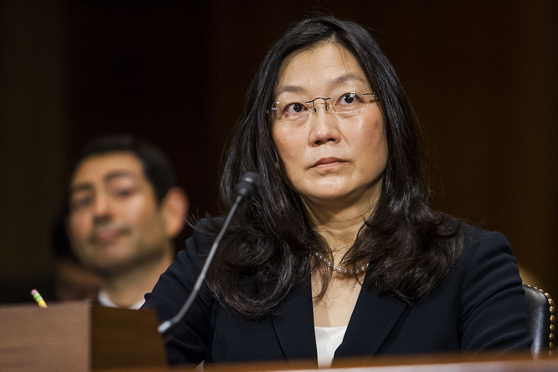Rip Up All the Qualcomm Licenses, Judge Koh Rules
U.S. District Judge Lucy Koh of the Northern District of California has handed a sweeping win to the FTC in its antitrust case against Qualcomm, calling out the wireless giant's lawyer-executives as the "architects, implementers, and enforcers" of anti-competitive practices.
May 22, 2019 at 08:33 AM
6 minute read
The original version of this story was published on The Recorder
 Judge Lucy Koh, U.S. District Court for the Northern District of California (Photo: Diego M. Radzinschi/ALM)
Judge Lucy Koh, U.S. District Court for the Northern District of California (Photo: Diego M. Radzinschi/ALM)
U.S. District Judge Lucy Koh of the Northern District of California has just brought a world of pain on Qualcomm Inc.
Koh threw the antitrust book at the San Diego chipmaker Tuesday night, finding in a 233-page order that Qualcomm illegally monopolized markets for the CDMA and 4G LTE modem chips used in premium smartphones.
The judge gave the Federal Trade Commission almost everything it wanted, ordering Qualcomm to stop threatening to cut off chip supplies to smartphone manufacturers who balk at its licensing terms—also known as Qualcomm's “no license, no chips” policy—and to renegotiate existing license agreements free of that threat.
“It makes little sense for the court, having found that Qualcomm's patent licenses are the product of anti-competitive conduct, to leave those licenses in place,” Koh wrote. “To permit Qualcomm to continue to charge unreasonably high royalty rates would perpetuate its artificial surcharge on rivals' chips, which harms rivals, [manufacturers], and consumers, and would enable Qualcomm to continue to reap the fruits of its Sherman Act violation.”
She further ordered Qualcomm to make its standard-essential patents available to rival chip suppliers—not just handset makers, or OEMs—on fair, reasonable and nondiscriminatory (FRAND) terms. And she instructed Qualcomm to stop entering into express “or de facto” exclusive dealing agreements or to interfere with any customer from communicating with government agencies about potential regulatory matters. Koh found that Qualcomm struck a $100 million deal with Samung last year, for example, “to extinguish Samsung's antitrust claims and to silence Samsung.”
Koh's findings of fact and conclusions of law culminate a bench trial held earlier this year in Federal Trade Commission v. Qualcomm. The judge found Qualcomm's witnesses gave “pretextual” testimony that was not credible when compared with internal documents and statements Qualcomm executives made to the Internal Revenue Service.
She called out Qualcomm lawyers for especially harsh blame. “Lawyers—including Derek Aberle, Steve Altman, Eric Reifschneider, Fabian Gonell, and Lou Lupin—were the architect, implementers, and enforcers of Qualcomm's licensing practices,” she wrote.
“Lawyers explicitly stated that Qualcomm's licensing practices raised concerns about antitrust liability, but chose to continue those practices anyway, with full knowledge that Qualcomm's unreasonably high royalty rates violate FRAND and that Qualcomm's licensing practices harm rivals. That willful, conscious decision to continue Qualcomm's licensing practices is further evidence of intent to harm competition.”
Aberle and Altman are former Qualcomm presidents. Reifschneider is a former general manager. Gonell is the current senior vice president for licensing strategy. Lupin is a former general counsel.
Koh also found that Qualcomm co-founder Irwin Jacobs threatened to stop and actually did stop supplying chips to LGE over a licensing dispute that began in 2004. “These chip supply threats are critical for maintaining Qualcomm's unreasonably high royalty rate,” Koh wrote.
Qualcomm said in a statement posted on its website that it will immediately seek a stay of the district court's judgment and an expedited appeal to the U.S. Court of Appeals for the Ninth Circuit. “We strongly disagree with the judge's conclusions, her interpretation of the facts and her application of the law,” said Don Rosenberg, executive vice president and general counsel of Qualcomm.
Federal Trade Commission Competition Director Bruce Hoffman said in a statement on the commission's website that the ruling “is an important win for competition in a key segment of the economy. FTC staff will remain vigilant in pursuing unilateral conduct by technology firms that harms the competitive process.”
The commission's trial team was led by Jennifer Milici and other FTC staff attorneys. Qualcomm has been represented in the FTC matter by a team of lawyers from Cravath, Swaine & Moore; Morgan, Lewis & Bockius; and Keker Van Nest & Peters.
Koh found that licensing represents two-thirds of Qualcomm's value, earning $7.7 billion as recently as 2016. That's more than Ericsson, Nokia, InterDigital and nine other licensors of modem chip patents combined, Koh found.
Qualcomm has maintained dominance over the CDMA and LTE markets through a variety of anticompetitive practices, the judge wrote. Those include “no license, no chips,” which includes the refusal to provide chip samples, technical support or enabling software. At the same time, Qualcomm refuses to provide OEMs lists of Qualcomm's patents or patent claim charts during license negotiations, she wrote. And the company has maintained a constant royalty rate of about 5% over some 20 years, even as its contribution to cellular standards is declining and its royalty rates remain “untested by litigation.”
Koh indicated that, based on the FTC's expert testimony and other corroborating evidence, Qualcomm's FRAND royalty rate should be below 1%.
“These unreasonably high royalty rates raise costs to OEMs, and harm consumers because OEMs pass those costs along to consumers,” she wrote. They also “may dissuade” OEMs from investing in new features, because they know they'll have to pay a percentage of the phone sale price to Qualcomm.
Qualcomm also refuses to license its standard-essential patents to other chipmakers, which Koh found “boxes out rivals.” The practice violates Qualcomm's commitment to standards-setting organizations to license on FRAND terms, and Federal Circuit case law that requires royalties be based on the smallest salable patent practicing unit, she found.
“Qualcomm attempts to eliminate competition in certain markets; eliminates competing standards; deprives rivals of revenues to invest in research and development and acquisitions; forecloses rivals from establishing technical and business relationships with OEMs; prevents rivals from field testing with OEMs, network vendors, and operators; and ensures that Qualcomm retains influence in [standard setting organizations], so that Qualcomm can maintain its time-to-market advantage and its unlawful monopoly,” she wrote. “By so hobbling rivals, Qualcomm's practices 'unfairly tend[] to destroy competition itself.”
This content has been archived. It is available through our partners, LexisNexis® and Bloomberg Law.
To view this content, please continue to their sites.
Not a Lexis Subscriber?
Subscribe Now
Not a Bloomberg Law Subscriber?
Subscribe Now
NOT FOR REPRINT
© 2025 ALM Global, LLC, All Rights Reserved. Request academic re-use from www.copyright.com. All other uses, submit a request to [email protected]. For more information visit Asset & Logo Licensing.
You Might Like
View All
Litigators of the Week: Kirkland Trio Send a $765M Message in Tech Theft Case

Litigators of the Week: How Quinn Emanuel Team Kept It Simple—And Won $1.1B Verdict for Caltech

Daily Dicta: Why the Feds Deserved to Fail in Fitbit Trade Secrets Case

Qualcomm Asks 9th Circuit to Stay Antitrust Injunction in FTC Case
Trending Stories
- 1SDNY US Attorney Damian Williams Lands at Paul Weiss
- 2Litigators of the Week: A Knockout Blow to Latest FCC Net Neutrality Rules After ‘Loper Bright’
- 3Litigator of the Week Runners-Up and Shout-Outs
- 4Norton Rose Sues South Africa Government Over Ethnicity Score System
- 5KMPG Wants to Provide Legal Services in the US. Now All Eyes Are on Their Big Four Peers
Who Got The Work
Michael G. Bongiorno, Andrew Scott Dulberg and Elizabeth E. Driscoll from Wilmer Cutler Pickering Hale and Dorr have stepped in to represent Symbotic Inc., an A.I.-enabled technology platform that focuses on increasing supply chain efficiency, and other defendants in a pending shareholder derivative lawsuit. The case, filed Oct. 2 in Massachusetts District Court by the Brown Law Firm on behalf of Stephen Austen, accuses certain officers and directors of misleading investors in regard to Symbotic's potential for margin growth by failing to disclose that the company was not equipped to timely deploy its systems or manage expenses through project delays. The case, assigned to U.S. District Judge Nathaniel M. Gorton, is 1:24-cv-12522, Austen v. Cohen et al.
Who Got The Work
Edmund Polubinski and Marie Killmond of Davis Polk & Wardwell have entered appearances for data platform software development company MongoDB and other defendants in a pending shareholder derivative lawsuit. The action, filed Oct. 7 in New York Southern District Court by the Brown Law Firm, accuses the company's directors and/or officers of falsely expressing confidence in the company’s restructuring of its sales incentive plan and downplaying the severity of decreases in its upfront commitments. The case is 1:24-cv-07594, Roy v. Ittycheria et al.
Who Got The Work
Amy O. Bruchs and Kurt F. Ellison of Michael Best & Friedrich have entered appearances for Epic Systems Corp. in a pending employment discrimination lawsuit. The suit was filed Sept. 7 in Wisconsin Western District Court by Levine Eisberner LLC and Siri & Glimstad on behalf of a project manager who claims that he was wrongfully terminated after applying for a religious exemption to the defendant's COVID-19 vaccine mandate. The case, assigned to U.S. Magistrate Judge Anita Marie Boor, is 3:24-cv-00630, Secker, Nathan v. Epic Systems Corporation.
Who Got The Work
David X. Sullivan, Thomas J. Finn and Gregory A. Hall from McCarter & English have entered appearances for Sunrun Installation Services in a pending civil rights lawsuit. The complaint was filed Sept. 4 in Connecticut District Court by attorney Robert M. Berke on behalf of former employee George Edward Steins, who was arrested and charged with employing an unregistered home improvement salesperson. The complaint alleges that had Sunrun informed the Connecticut Department of Consumer Protection that the plaintiff's employment had ended in 2017 and that he no longer held Sunrun's home improvement contractor license, he would not have been hit with charges, which were dismissed in May 2024. The case, assigned to U.S. District Judge Jeffrey A. Meyer, is 3:24-cv-01423, Steins v. Sunrun, Inc. et al.
Who Got The Work
Greenberg Traurig shareholder Joshua L. Raskin has entered an appearance for boohoo.com UK Ltd. in a pending patent infringement lawsuit. The suit, filed Sept. 3 in Texas Eastern District Court by Rozier Hardt McDonough on behalf of Alto Dynamics, asserts five patents related to an online shopping platform. The case, assigned to U.S. District Judge Rodney Gilstrap, is 2:24-cv-00719, Alto Dynamics, LLC v. boohoo.com UK Limited.
Featured Firms
Law Offices of Gary Martin Hays & Associates, P.C.
(470) 294-1674
Law Offices of Mark E. Salomone
(857) 444-6468
Smith & Hassler
(713) 739-1250






